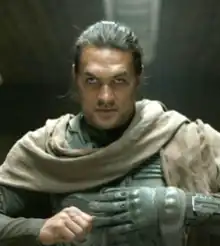| Duncan Idaho | |
|---|---|
| Dune character | |
 Jason Momoa in the film Dune (2021) | |
| First appearance | Dune (1965) |
| Last appearance | The Winds of Dune (2009) |
| Created by | Frank Herbert |
| Portrayed by | |
| In-universe information | |
| Occupation | Atreides Swordmaster, later Mentat |
| Affiliation | House Atreides Swordmasters of Ginaz |
| Spouse |
|
| Children | |
Duncan Idaho is a fictional character in the Dune universe created by Frank Herbert. Introduced in the first novel of the series, 1965's Dune, he became a breakout character and was revived in 1969's Dune Messiah.[3] He is the only character to feature in all six of Herbert's original Dune novels.
Idaho was portrayed by Richard Jordan in David Lynch's 1984 film version of Dune, and by James Watson in the 2000 Sci-Fi Channel miniseries. Edward Atterton assumed the role in the 2003 miniseries Children of Dune. The character is played by Jason Momoa in the 2021 Denis Villeneuve film Dune.
Description
In Dune (1965), Duncan is described as a handsome man with "curling black hair" to whom women are easily attracted. Paul Atreides notes Duncan's "dark round face" and "feline movements, the swiftness of reflex that made him such a difficult weapons teacher to emulate." And in Dune Messiah (1969) he is described as having "high cheekbones" and "definite epicanthic folds."[4] Lady Jessica calls him "the admirable fighting man whose abilities at guarding and surveillance are so esteemed." Duncan is fiercely loyal to House Atreides, a skilled pilot, and as a Swordmaster of the Ginaz is a gifted hand-to-hand fighter.[5] In the fight that ends with his death in Dune, Duncan kills an unheard-of 19 Sardaukar, the Padishah Emperor's fearsome supersoldiers.[6] The Sardaukar sell his body to the Tleilaxu; subsequent gholas of Duncan possess the rebellious streak of the original.
In 1976's Children of Dune, Lady Jessica tells Duncan that he was drawn to her daughter Alia because "you wanted a girl you saw as a younger version of me."[7] In God Emperor of Dune (1981), the latest Duncan ghola discovers that one of his predecessors had fathered a child with a woman named Irti who closely resembles Jessica.[8]
Appearances


Dune
At the time of Frank Herbert's original novel Dune (1965), Idaho is a Swordmaster of the Ginaz in the service of House Atreides and one of Duke Leto's right-hand men (with Gurney Halleck and Thufir Hawat). When the Atreides take over the planet Arrakis at the order of the Padishah Emperor Shaddam IV, Idaho becomes Leto's ambassador to the Fremen, the desert people of Dune that Leto hopes will ally with him in the coming war against the Emperor and the Harkonnens. Idaho goes to live with the Fremen, serving both Leto and Fremen leader Stilgar. When the Emperor's dreaded Sardaukar attack Arrakis in the guise of Harkonnen troops, Idaho initially survives the assault and saves Leto's son Paul Atreides and concubine Lady Jessica. When they are cornered at a Botanical Testing Station, Paul and Jessica flee while Idaho holds off the enemy, but he is ultimately killed.[5] It is noted in Dune Messiah (1969) that a "grievous head wound" had caused Idaho's death,[9] and made clear in Children of Dune (1976) that Idaho had killed an unheard-of tally of nineteen Sardaukar before dying.[6]
Dune Messiah and Children of Dune
Idaho returns in Dune Messiah (1969) as a ghola made by the Tleilaxu and given to Paul Atreides, now Emperor. The purpose of the gift is 'psychic poison': the ghola, named Hayt, is supposed to tempt the Kwisatz Haderach Paul into becoming that which he despises. Trained as a Mentat and a Zensunni philosopher, Hayt has no memory of his former life, but constantly feels vague hints and reminders of his previous incarnation that make him hope he can recover those memories.
The seemingly harmless dwarf Bijaz recognizes that Hayt is failing to destroy the Emperor psychologically. As the ghola is of Tleilaxu design, Bijaz employs a specific humming intonation that renders Hayt open to implanted commands. Bijaz programs Hayt to kill Paul when he says the words "She is gone," in the depths of grief over the death of his concubine Chani. But this is only part of the true plan; the emotional distress of the attempt allows Hayt to recover the buried memories of Duncan Idaho, up to and including his death at the hands of the Imperial Sardaukar. This is the culmination of the Tleilaxu plot, as masterminded by the Face Dancer Scytale—to demonstrate to Paul that the Tleilaxu can create for him an exact duplicate of his dead concubine, and lover, Chani—but only if he abdicates his throne and relinquishes his CHOAM holdings. Paul resists the temptation, killing Scytale himself and having Hayt/Duncan kill Bijaz.
Also in Dune Messiah, hints are dropped of a growing attraction between Idaho and Paul's sister, Alia. In one scene, Duncan even kisses Alia, which infuriates her; he replies that he took no more than what was offered. When a blinded Paul abdicates and wanders into the desert to die (as is the tradition for blind Fremen), Alia asks Idaho for his continued support and affection to help her get through the times ahead.
In 1976's Children of Dune, Idaho is now Alia's husband and Mentat. She has assumed power as Holy Regent in the name of Paul's children, Leto II and Ghanima. Alia becomes possessed by the memory-ego of her ancestor, the Baron Vladimir Harkonnen, who sets out to destroy the Atreides empire. Recognizing this, Idaho remains loyal to the Atreides, and flees to the desert to protect the children. In order to get Stilgar to join the Fremen opposition to Alia's rule, Duncan kills Javid, Alia's secret lover, on the neutral ground of Sietch Tabr. He also insults Stilgar three times, by saying to him the three deadliest insults a Fremen could ever hear: "You wear a collar!", "You are a servant! You've sold Fremen for their water!" and "You have no immortality! None of your descendents carry your blood!" Duncan then allows himself to be struck down by an enraged Stilgar, who realizes afterward that Alia would be forced by political necessity to execute him and his only hope of survival is to join the Fremen rebels—which is what Duncan had planned from the beginning. Duncan's last gasping words were, "Two deaths for the Atreides. The second for no better reason than the first."
God Emperor of Dune
God Emperor of Dune (1981) reintroduces Idaho as a serial ghola: Leto II has ruled as a sandworm-human hybrid for 3,500 years, and has continually had an Idaho ghola to serve him. Beyond his personal affection for Idaho, to Leto Idaho represents loyalty, humanity, and the spirit of the unknown, something which the God Emperor, having perfect prescience, knows nothing of. It is also implied that Duncan is needed for Leto's plan for humanity's ultimate survival — called the Golden Path — to come to fruition. However, the Idaho gholas, with their memories restored, struggle to deal with what the Atreides have become. Where before, the hallmark of Atreides rule was justice, Leto's reign has been one of godhood and oppression. Idaho's old-fashioned conscience rebels, leading the Idaho ghola to attempt to kill Leto (who as a sandworm is invulnerable to all but water and extreme violence). Leto notes that only nineteen of "his" Duncans have survived long enough to die what is considered a "natural death." In just about all of these rebellions, the Idaho ghola is killed by the God Emperor. After a certain time, the God Emperor orders another one from the Tleilaxu, or the Tleilaxu themselves just send another one as a token for their security.[8]
The novel chronicles the perceptions and actions of a new Duncan that has just been ordered from the Tleilaxu. Like the others before him, Duncan is appalled at what Atreides rule has become, but Leto appoints him as the head of his otherwise all-female military, the Fish Speakers. Leto also reveals that he has repeatedly used his Duncan gholas in his breeding program to genetically improve the Atreides line. The current Duncan is intended to mate with Siona Atreides, the end product of Leto's breeding program: she is invisible to prescient sight. Duncan is extremely reluctant and protests, saying that he is not Leto's stud. He does catch the eye of Hwi Noree, the Ixian Ambassador sent to Arrakis with the explicit purpose of wooing the Emperor. Leto forbids Duncan from having any relations with her, but he disobeys and sleeps with Hwi.[8]
Duncan eventually joins Siona's rebels and works with her to assassinate Leto. His plan is successful, but Hwi is killed in the process. Leto reveals that he knew of their plan, and that his death is simply another step to ensuring the Golden Path. Siona, having seen the Golden Path during her trial in the desert, realizes she was bred as a key figure for humanity's survival. At the end of the novel, she schemes on how to carefully seduce Duncan and mate with him, as Leto had originally intended. None of their descendants will be able to be tracked by prescience, forever free of any one person's vision and ensuring that humanity could never be completely found and destroyed.[8]
Fifteen hundred years later in Chapterhouse: Dune (1985), the Bene Gesserit Bellonda assesses the many Duncans who came before:
In the original and early gholas, his character had been dominated by impulsiveness. Quick to hate, quick to give loyalty. Later Idaho-gholas tempered this with cynicism but the underlying impulsiveness remained. The Tyrant had called it to action many times. Bellonda recognized a pattern. He can be goaded by pride. His long service to the Tyrant fascinated her. Not only had he been a Mentat several times but there was evidence he had been a Truthsayer in more than one incarnation.[10]
Heretics of Dune and Chapterhouse Dune
The Bene Gesserit become the consumers of Idaho gholas in Heretics of Dune (1984) and Chapterhouse Dune (1985). However, the gholas are repeatedly assassinated after several years, and the Sisterhood suspect the Tleilaxu. Not knowing exactly what purpose Idaho will serve, the Bene Gesserit believe that the Tleilaxu are using the gholas to control the timing of his release upon the universe, implying some Tleilaxu purpose in addition to their own. The current ghola survives such an attempt and Miles Teg is able to restore the memories of Duncan Idaho to the ghola, but Duncan can feel that the Tleilaxu planted something else in his mind. When Murbella, an Honored Matre, tries to sexually bond Idaho, he entraps and enslaves her, revealing the Tleilaxu purpose: To conquer the Honored Matres by using a better version of their own sexual techniques. When Murbella tries to bond Duncan, the Tleilaxu's plan comes to fruition, and he becomes aware of the memories of all the other Idaho gholas, though he is also imprinted to her. It is later determined that the Tleilaxu had mixed the cells from almost all of the Idaho gholas to make this one. Idaho and Murbella are confined to a no-ship on Chapterhouse. There, Idaho trains young men to go out into the universe and enslave Honored Matres. Duncan also inherits an awkward prescient vision, wherein he sees an old man and woman staring back at him. Duncan restores the memories of the Miles Teg ghola, and escapes in the no-ship, evading the trap set for him by the strange couple.
Hunters of Dune and Sandworms of Dune
Brian Herbert and Kevin J. Anderson continued from the original series with Hunters of Dune (2006) and Sandworms of Dune (2007), originally planned to be Dune 7 by Frank Herbert. Duncan continues his travels on the no-ship, now named the Ithaca by its passengers. He is accompanied by Miles Teg, Sheeana and a group of her Bene Gesserit sisters, the last Tleilaxu Master Scytale, and many others.
Duncan and the other refugees from Chapterhouse are still on the run from the Unknown Enemy that hunts them. They don't learn until near the end that the Enemy is the revived empire of thinking machines, and the old couple are actually the computer-entity Omnius and the robot Erasmus. In the final confrontation with Omnius, Paul Atreides (brought back as a ghola and with his power of prescience just restored), and then Norma Cenva (the Oracle of Time to the Navigators), both reveal that Duncan is the Ultimate Kwisatz Haderach; not Paul ( who is an "imperfect" Kwisatz Haderach) nor any other Atreides, nor their descendants. Overwhelmed by the unexpected revelations, Duncan decides to unite humanity and the thinking machines—after Cenva permanently removes Omnius from existence—rather than bring about the absolute destruction of intelligent technology for the second time in history.
Assuming the responsibility of mediator between the two sides, and with Erasmus' willing participation (the robot being left as the leader and controlling-force of the thinking machines), Duncan does something similar to Bene-Gesserit Sharing with the robot; possibly along with what seems to be a physical-bonding (similar to what Leto II did with the sandtrout) into something of a human-machine hybrid. Erasmus then voluntarily "dies", while remaining an Other Memory speaking to Duncan. In addition to being the Final Kwisatz Haderach of the humans, Duncan becomes the new evermind of the thinking machines, guiding their joint future.
Prelude to Dune
According to the Prelude to Dune prequel trilogy (1999–2001) by Brian Herbert and Kevin J. Anderson, Duncan Idaho is born on the planet Giedi Prime, under the Harkonnen Regime. His hatred for the Harkonnens is established when, at eight years of age, his parents are murdered in front of him by Glossu Rabban.[11] Rabban subsequently chooses young Idaho to be the prey for one of his hunts, but Idaho's resourcefulness and the aid of a woman who wants to punish the Harkonnens enables him to escape Giedi Prime for the planet Caladan. Upon arriving at the Atreides palace, he becomes a stableboy at Duke Paulus Atreides' request. After Paulus' death, Idaho expresses his desire to become a Ginaz Swordmaster. In the trilogy's second installment Dune: House Harkonnen, Duncan undergoes the immense rigors needed to be a Swordmaster; he is promoted to the title, alongside a Grumman friend named Hiih Resser, and helps defeat a mob of insurgent students. At the time of Dune: House Corrino, Duncan is an instrumental part of the liberation of the planet Ix from the Sardaukar and Tleilaxu, and even manages to defeat Count Hasimir Fenring in single combat.[12]
In adaptations
In the 1984 film Dune, Duncan is played by Richard Jordan,[13][14] and James Watson portrays the character in the 2000 miniseries Frank Herbert's Dune.[14] As in the novel Dune, Duncan has only a minor role in both of these adaptations.
In the 2003 miniseries sequel Frank Herbert's Children of Dune, the ghola of Duncan (known in the novels as "Hayt") is played by Edward Atterton.[15] Emmet Asher-Perrin of Tor.com writes that Atterton "plays the mentat ghola reincarnation of Idaho with all the upright stoicism and vulnerability that the character is owed."[16]
The character is played by Jason Momoa in the 2021 Denis Villeneuve film Dune.[17][18]
Family tree
| |||||||||||||||||||||||||||||||||||||||||||||||||||||||||||||||||||||||||||||||||||||||||||||||||||||||||||||||||||||||||||||||||||||||||||||||||||||||||||||||||||||||||||||||||||||||||||||||||||||||||||||||||||||||||||||||||||||||||||||||||||||||||||||||||||||||||||||||||||||||||||||||||||||||||||||||||||||||||||||||||||||||||||||||||||||||||||||||||||||||||||||||||||||||||||||||||||||||||||||||||||||||||||||||||||||||||||||||||||||||||||||||||||||||||||||||||||||||||||||||||||||||||||||||||||||||||||||||||||||||||||||||||||||||||||||||||||||||||||||||||||||||||||||||||||||||||||||||||||||||||||||||||||||||||||||||||||||||||||||||||||||||||||||||||||||||||||||||||||||||||||||||||||||||||||||||||||||||||||||||||||||||||||||||||||||||||||||||||
Notes:
| |||||||||||||||||||||||||||||||||||||||||||||||||||||||||||||||||||||||||||||||||||||||||||||||||||||||||||||||||||||||||||||||||||||||||||||||||||||||||||||||||||||||||||||||||||||||||||||||||||||||||||||||||||||||||||||||||||||||||||||||||||||||||||||||||||||||||||||||||||||||||||||||||||||||||||||||||||||||||||||||||||||||||||||||||||||||||||||||||||||||||||||||||||||||||||||||||||||||||||||||||||||||||||||||||||||||||||||||||||||||||||||||||||||||||||||||||||||||||||||||||||||||||||||||||||||||||||||||||||||||||||||||||||||||||||||||||||||||||||||||||||||||||||||||||||||||||||||||||||||||||||||||||||||||||||||||||||||||||||||||||||||||||||||||||||||||||||||||||||||||||||||||||||||||||||||||||||||||||||||||||||||||||||||||||||||||||||||||||
References
- 1 2 Herbert, Brian; Kevin J. Anderson (2006). Hunters of Dune.
- 1 2 Herbert, Brian; Kevin J. Anderson (2007). Sandworms of Dune.
- ↑ Herbert, Frank; Herbert, Brian; Anderson, Kevin J. (August 11, 2005). "The Letters of Dune". The Road to Dune. Tor Books. p. 279. ISBN 0-7653-1295-6.
- ↑ Herbert, Frank (1969). Dune Messiah.
- 1 2 Herbert, Frank (1965). Dune.
- 1 2 Herbert, Frank (1976). Children of Dune. pp. 227. ISBN 0-575-07490-6.
The Sardaukar who'd slain him reported his prowess: nineteen of their number dispatched by Idaho before he'd fallen. Nineteen Sardaukar!
- ↑ Herbert, Frank (1976). Children of Dune. ISBN 9780425043837.
- 1 2 3 4 Herbert, Frank (1981). God Emperor of Dune.
- ↑ Herbert, Frank (1969). Dune Messiah.
... our wise Sardaukar commander had Idaho's corpse preserved for the axolotl tanks ... This corpse held the flesh and nerves of one of the finest swordsmen in history, an adviser to the Atreides, a military genius ... He was killed here on Arrakis ... a grievous head-wound which required many months of regrowth.
- ↑ Herbert, Frank (1985). Chapterhouse: Dune.
- ↑ Herbert, Brian; Kevin J. Anderson (1999). Dune: House Atreides. pp. 57. ISBN 0-553-11061-6.
- ↑ Herbert, Brian; Kevin J. Anderson (1999–2001). Prelude to Dune.
- ↑ Maslin, Janet (December 14, 1984). "Movie Review: Dune (1984)". The New York Times. Retrieved March 15, 2010.
- 1 2 Schaefer, Sandy (February 14, 2019). "Jason Momoa in Talks for Denis Villeneuve's Dune Movie Reboot". Screen Rant. Retrieved February 22, 2019.
- ↑ Fries, Laura (March 11, 2003). "Review: Children of Dune". Variety. Archived from the original on August 21, 2015. Retrieved August 21, 2015.
- ↑ Asher-Perrin, Emmet (September 19, 2017). "SyFy's Children of Dune Miniseries Delivers On Emotion When Philosophy Falls Flat". Tor.com. Retrieved February 20, 2019.
- ↑ Fleming Jr, Mike (February 14, 2019). "Aquaman's Jason Momoa Joins Killer Cast of Denis Villenueve's Dune". Deadline Hollywood. Retrieved February 14, 2019.
- ↑ Kroll, Justin (February 14, 2019). "Jason Momoa Joins Timothee Chalamet, Javier Bardem in Dune Reboot". Variety. Retrieved February 14, 2019.